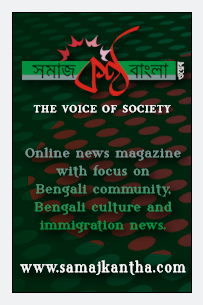Calgary, Alberta, October 2nd: Delwar Jahid, a prominent author, researcher, and journalist based in Canada, offered valuable insights into the current political situation in Bangladesh during a virtual discussion hosted by prominent journalist and social media blogger Shaheen Ahmed. The discussion, originating from Alberta, Canada, highlighted the pressing concerns regarding the state of democracy in Bangladesh, which have not only captured the nation's attention but also drawn the interest of Western countries, particularly the United States.
Amidst Tensions and Uncertainties
Delwar Jahid began the discussion by acknowledging the palpable tensions and uncertainties currently plaguing Bangladesh. At the forefront of these concerns are the upcoming national elections, which have generated significant debate and apprehension both within the country and abroad, especially in Western nations such as the United States.
Challenges for the Ruling Awami League
Jahid shed light on the formidable challenges facing the ruling Awami League, as they aim to meet the constitutional deadline and hold elections by January. Among the hurdles confronting the party are soaring commodity prices, inflation, a growing economic crisis, and dwindling foreign exchange reserves. International pressure, particularly sanctions imposed by the United States, has added to the government's concerns. Additionally, the ill health of prominent opposition leader Begum Khaleda Zia further complicates the political landscape, presenting a substantial challenge for the Awami League.
Healthcare Crisis
The discussion highlighted the dire state of the healthcare sector in Bangladesh, where the death toll from dengue has surpassed a thousand. Concerns have arisen over the perceived ineffectiveness of local government and the Ministry of Health, casting doubts on the government's ability to address these pressing health issues that concern the general public.
Political Deadlock and Medical Treatment Refusal
One of the most critical issues discussed was the ongoing political deadlock between the Awami League and the opposition Bangladesh Nationalist Party (BNP), which has resulted in a severe political crisis in Bangladesh. The government's refusal to permit Begum Khaleda Zia to seek medical treatment abroad has exacerbated the situation, leading to international pressure.
Emphasis on Dialogue and National Consensus
Delwar Jahid stressed the paramount importance of dialogue as an effective means to break the political deadlock. He emphasized the urgent need for national consensus and cooperation to ensure that the upcoming elections are conducted fairly, inclusively, and in accordance with the expectations of Western countries, including the United States.
US Commitment to the Democratic Process
The discussion underscored the United States' commitment to promoting peaceful, free, and fair elections in Bangladesh. The United States has expressed its willingness to impose additional sanctions if necessary, particularly against actions that undermine the democratic process.
Productive Political Dialogue and International Recognition
Jahid highlighted the significance of productive political dialogue in Bangladesh, especially in an era of global polarization and ongoing debates. Prime Minister Sheikh Hasina has pledged to ensure free and fair elections, expressing hope that the BNP's participation, possibly through Western countries or political compromise, can help resolve the crisis and strengthen Bangladesh's democracy. Regardless of the election's outcome, Jahid suggests that international recognition is crucial for the country's continued progress towards democracy.















